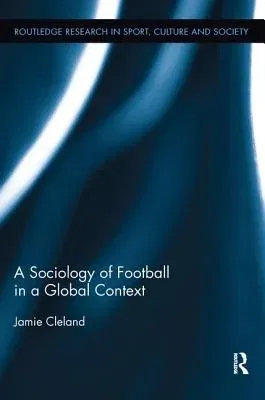Jamie Cleland
(Author)A Sociology of Football in a Global ContextPaperback, 14 December 2016

Qty
1
Turbo
Ships in 2 - 3 days
Only 1 left
Free Delivery
Cash on Delivery
15 Days
Free Returns
Secure Checkout

Part of Series
Routledge Research in Sport, Culture and Society
Print Length
178 pages
Language
English
Publisher
Routledge
Date Published
14 Dec 2016
ISBN-10
1138292133
ISBN-13
9781138292130
Description
Product Details
Author:
Book Format:
Paperback
Country of Origin:
US
Date Published:
14 December 2016
Dimensions:
22.86 x
15.24 x
1.02 cm
Genre:
Sociological
ISBN-10:
1138292133
ISBN-13:
9781138292130
Language:
English
Location:
Oxford
Pages:
178
Publisher:
Weight:
258.55 gm